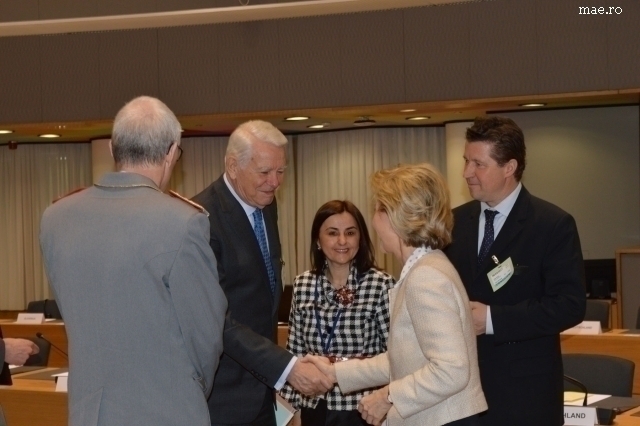The meeting of the EU foreign ministers
Cooperation in the defence field might define a multi-speed Europe, a project that has been criticised by the countries in the eastern part of the Union.

Roxana Vasile, 07.03.2017, 13:17
Defence and Foreign Ministers of EU states, including Romania, who gathered in Brussels on Monday, laid the foundations for “the general military headquarters” of the European Union, whose prerogatives will include, among other things, the planning and operational management of non-combat missions, such as those unfolding in the Republic of Congo, Mali and Somalia. The EU foreign ministers have also approached the EU-Egypt relations.
Apart from tackling issues related to that country’ economic and political development, the ministers discussed some of the objectives that both Brussels and Cairo have earlier pledged to meet as part of the Middle East peace process, as well as the situation in Libya and Syria, respectively.
As regards Syria, the EU High Commissioner for Foreign Affairs and Security Policy, Federica Mogherini, has announced that in April, Brussels will host a conference laying emphasis on the post-conflict reconstruction of a country that has weathered far too many storms. The defence field, which is considered of utmost importance in the current extremely complicated geo-political context, is in the focus of attention of the EU heads of state and government! In recent times there has been much talk on re-launching the community project, against the backdrop of Great Britain’s decision to leave the Union, on the one hand, and of the exponential growth of populist ideas and implicitly of populist parties, whose leaders go to such lengths as to plead for the dismantling of the European community bloc, on the other.
Therefore, one of the scenarios that are currently being circulated refers to the idea of a Europe developing at different speeds. Its engine should be intense but drastically limited cooperation in the defence field. Europe can re-launch itself through this sector, French President Francois Hollande said on Monday, when he received the German Chancellor Angela Merkel, Spanish Prime Minister Mariano Rajoy and Italian Prime Minister Paolo Gentiloni at the Versailles Palace. According to the French President, some of the reasons which call for such a measure include the recent election as US President of Donald Trump, who has made an increasing number of declarations stating his lack of confidence in the EU and NATO, on the one hand, and Russia’s huge ambitions, on the other.
Whether the idea of boosting European cooperation is welcome, the way it is conceived definitely stirs discontent: only some member states might be involved, making up a so-called “hard core”, somehow sidelining, at least temporarily, the East European countries, considered to be less developed. “Unity is not uniformity”, the French President François Hollande has underlined, adding that some countries can go faster and farther away, apart from defence, as cooperation might later be boosted by deepening the economic and monetary Union, by means of harmonizing fiscal legislation and social standards or by developing joint programs devoted to youth and culture. In turn, Angela Merkel also believes the Europeans should have the courage to accept that some countries are advancing at a faster pace than others, without however shutting out those lagging behind. (Translated by D. Vijeu)






























